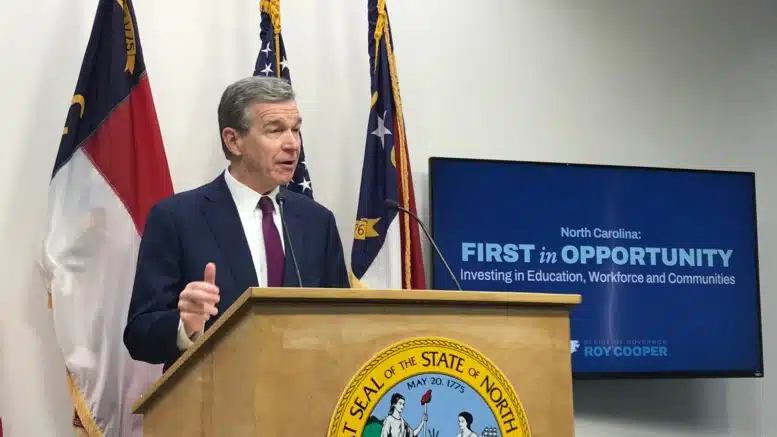By Rose Hoban
Even as the coronavirus emergency winds down, hundreds of millions of dollars allocated by federal lawmakers are still flowing to North Carolina.
Against that backdrop on Wednesday morning, Gov. Roy Cooper presented what will be his final biennial state budget proposal. With less than two years left in his second term (and state law prohibiting governors from serving more than two consecutive terms), Cooper called for allocating many of the federal dollars toward a well-positioned future.
“To make sure we have the well-trained workforce for the jobs of today and tomorrow, [the spending plan] invests in our schools, our health, our safety, our transportation, our water, our state employee workforce and our families,” Cooper told reporters gathered at the Department of Administration building in Raleigh, where he outlined his plans for most of the $33.9 billion projected to hit state coffers when taxes are collected later this year. That amount includes a projected $3.25 billion surplus.
Inside the Legislative Building, just one block east on Jones Street, the lawmakers who hold more sway in what gets funded in the state’s two-year budget immediately responded with a dimmer view of Cooper’s vision for North Carolina.
Both General Assembly chambers have Republican majorities, and the Democratic governor’s spending proposal landed there with a loud thud.
“This is an irresponsible, unserious proposal from a lame-duck governor,” Senate leader Phil Berger (R-Eden) said in a statement.
Tim Moore (R-Kings Mountain), the speaker of the House of Representatives, called Cooper’s budget “unrealistic.”
Such rhetoric comes as Republicans hold a supermajority in Berger’s chamber and are only one seat shy of a supermajority in the House. That puts Republicans in a more powerful position than in previous years, when Cooper used his veto power to block spending plans that he did not think invested enough in teachers, public education and Medicaid expansion.
This year, as part of a negotiated agreement between Senate and House Republicans, one of Cooper’s long-held priorities — Medicaid expansion — will be in whatever budget finally emerges from the legislature and lands on his desk for his signature.
Until Cooper sees that budget, though, he offered his vision for how to spend $32.9 billion. Much of that vision has to do with bolstering health care in the state, starting with the much-heralded Medicaid expansion.
Cooper’s proposal would also go a long way toward funding early child care programs, training a health care workforce that is struggling with shortages and substandard pay, and bolstering the state’s ailing mental health system.
A priority finally realized
When Cooper was elected to office in 2016, he made it clear that one of his top priorities was to expand the state’s Medicaid system, a state- and federally funded health care program that covers more than 2.9 million beneficiaries: children and some of their parents in low-income families, some people with disabilities and elderly residents with low incomes.
Expanding Medicaid is a policy that was supposed to roll out across the country as a result of President Barack Obama’s hallmark Affordable Care Act, but a 2012 Supreme Court ruling left the decision about expansion up to states. Soon after, in 2013, the newly Republican-led General Assembly passed legislation blocking the governor from being able to expand the program unilaterally.
Cooper’s Medicaid wishes could be about to come true. Republican leaders in the legislature finally have come around to agreeing that the policy would provide coverage for some 600,000 low-income workers while also strengthening rural hospitals and providing federal funds for many programs that have been funded by state dollars in the past.
As an inducement to expansion, federal officials have offered North Carolina and other holdout states no-strings-attached bonuses that will flow once the expansion bill becomes law. For North Carolina, that bonus will top $1.74 billion.
Cooper’s plan for much of that money, announced last week, includes creating the Improving Health Outcomes for People Everywhere fund (IHOPE) to bolster the state’s ailing and failing mental health system.
“The IHOPE fund designates $1 billion for mental health and substance abuse with funding for inpatient and community care, facilities and support for those in mental health crisis, integrating mental health and primary care practices and schools, and to address mental health in the justice system,” he said.
That funding includes:
- $225 million over three years to improve reimbursement rates for behavioral health treatment
- $200 million to enhance the mental health crisis response system, including creating transitional housing for people being discharged from psychiatric treatment
- $175 million to help primary care practices get up to speed with behavioral health care, along with expanding mental health supports in schools
- $100 million to improve discharge options for psychiatric patients, and offer salary and loan-repayment inducements for staff at those facilities
- $150 million to improve interactions between the justice and the mental health systems
- $50 million to provide startup funding for telehealth initiatives in rural and underserved parts of the state, as well as create an electronic registry of psychiatric beds throughout the state
- $100 million to expand behavioral supports for foster children and people in recovery from substance use and mental health issues
Enhanced focus on child care, aging services
Cooper’s proposal doubles down on both ends of the lifespan, starting with additional spending to enhance child care services and the state’s NC Pre-K system.
“My budget proposes $1.5 billion more for early childhood education and childcare, to benefit our youngest children who need to learn, their parents who need to work and our businesses which need to hire them,” Cooper said.
The plan would increase the rates paid to NC Pre-K providers for children receiving the state’s early childhood subsidy and increase the number of slots for NC Pre-K students. It also spends close to a half a billion dollars to help new childcare centers get up and running, while also providing funding to existing centers to upgrade and increase pay for teachers.
Closer to the end of life, Cooper’s budget would spend $34.8 million to create housing supports and home repair funds for aging rural North Carolinians who are at risk of needing to enter a nursing home rather than remaining in their own homes.
Cooper’s budget director Kristin Walker noted that North Carolina’s demographics are shifting, that the population is getting older on average as many people live longer than the generations that preceded them.
“By 2029, one in five North Carolinians will be older than 65. And not long after that, the population over 65 will exceed our population under 18,” Walker told reporters.
Feeding the health care worker pipeline
In the wake of the pandemic, hospitals — private and state-funded facilities — have been grappling with an exodus of health care workers who have been exhausted by the demands of the COVID-19 pandemic.
Cooper said he wants to help reverse that trend, starting with increasing pay rates for direct service providers who work with vulnerable people living in nursing homes and in their own homes. Those workers have fled their low-paying jobs for better paying opportunities in fast food restaurants and big box stores, where they can make more than the $11.50 average hourly director service worker pay.
The governor’s budget would make permanent part of a pay increase that these workers received during the pandemic, at a cost of $18 million in the first year of the biennium and $72 million in the second year. The goal is to bring many of these workers’ pay up to a more competitive $18/hour.
Funding will go to community colleges, a critical pipeline for many health care training and jobs. Keeping instructors has been a challenge when salaries at community colleges are far less than what those potential instructors can make elsewhere.
Cooper’s budget includes $33.3 million in the first year of the biennium and $45 million in the second for faculty bonuses in such high-need areas. The money would also go to pay the working nurses who do hands-on instruction for students in hospitals and clinics.
The other place Cooper identified as needing health care workers is the school system. His budget would allocate $134 million in funding for 1,000 school psychologists, counselors and school social workers, targeted to rural and underserved parts of the state.
In addition to pay raises for state workers and one-time retention bonuses, Cooper proposed slowing down scheduled income tax reductions only for people earning more than $200,000. He also said he would not eliminate the corporate tax, which is due to be eliminated later in this decade.
Close window X
Republish this article
You are free to use NC Health News content under the following conditions:
- You can copy and paste this html tracking code into articles of ours that you use, this little snippet of code allows us to track how many people read our story.
- Please do not reprint our stories without our bylines, and please include a live link to NC Health News under the byline, like this:By Jane DoeNorth Carolina Health News
- Finally, at the bottom of the story (whether web or print), please include the text:North Carolina Health News is an independent, non-partisan, not-for-profit, statewide news organization dedicated to covering all things health care in North Carolina. Visit NCHN at northcarolinahealthnews.org. (on the web, this can be hyperlinked)
by Rose Hoban, North Carolina Health News
March 16, 2023
1









